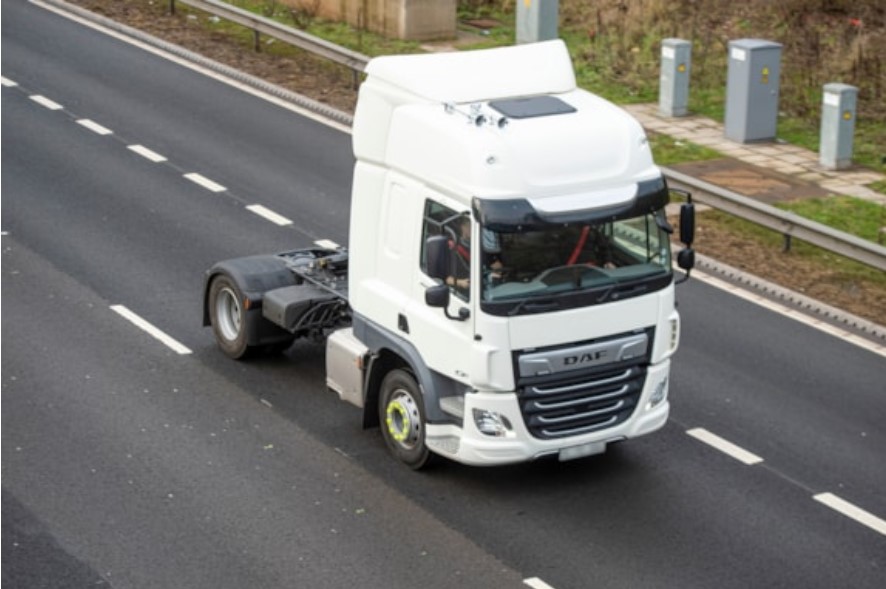More than 200 offences spotted in week of action along M6

One of the unmarked Operation Tramline HGVs
Police patrolling the M6 in National Highways’ unmarked HGV cabs spotted some 230 offences being committed by road users during a week of action.
More than 200 vehicles were stopped as forces along the length of the motorway took part in the multi-agency operation targeting unsafe drivers last month.
The most common offences were, once again, using a mobile phone (81) and not wearing a seatbelt (54).
From their elevated viewpoint in the unmarked HGV cabs, police officers were able to look across into HGVs or down into cars and vans. Consequences for drivers ranged from warnings to fixed penalty notices, court summons or arrest.
It came after footage was released by National Highways and police partners highlighting some of the shocking behaviour spotted by officers using the Operation Tramline cabs.
They included a motorist driving along the M40 in the morning traffic applying her make-up while swerving across her lane, oblivious to the police officers alongside her.
Another showed a van driver steering with his knees on the M6 in Warwickshire as he tucked into his fast food – fries in one hand and a drink in the other. A third incident captured a motorist driving along the M40 with a phone in her hand and ‘doing something’ with the laptop next to her.
More than 46,150 offences have been recorded by officers in the Operation Tramline HGV cabs since the national safety initiative was launched by National Highways in 2015. The most common offences are not wearing a seatbelt (13,562) and using a mobile phone (11,965).
The aim of the week of action was to target unsafe drivers and reduce incidents on the motorway. National Highways deals with over 200 reported incidents on the M6 every day – 74,960 on the road in 2023 including 3,808 traffic collisions. The M6 is the longest motorway in the country, and so the crackdown was labelled Operation Vertebrae.
As well as the drivers spotted by the unmarked cabs, officers from the North West Commercial Vehicle Unit were also carrying out vehicle checks and stopped 67 vehicles with a total of 61 offences recorded including weight issues, not complying with drivers’ hours regulations, mobile phone, seatbelt offences and even drugs/drink offences.
Meanwhile the DVSA were stopping vehicles at Cuerden, Lancashire, and Doxey in Staffordshire, where they found 10 overloaded vehicles, drivers working over their permitted hours, without a licence or appropriate documents and even without a tachograph fitted to the HGV. There were 23 immediate HGV prohibitions meaning an issue had to be corrected before the vehicle could continue its journey.
National Highways Regional Road Safety Programme Manager, Lisa Scott, said:
“This was a huge operation, working with a host of our police and road safety partners, to raise awareness of some of the dangerous behaviours taking place on our roads and to persuade those drivers to think again.
“We know that is it a minority of drivers who put themselves at risk but every single person using their mobile phone at the wheel or not putting on their seatbelt is one too many – we want everyone using our roads to get home safely.
“Which is why operations like this are so important to make those drivers reconsider their unsafe driving and to let them know that if they don’t, they face a very real risk of being caught out by police officers patrolling in our unmarked cabs.”
Several forces took part in Operation Vertebrae either with the National Highways cabs or carrying out increased patrols. They were Lancashire, Cumbria, Merseyside, Greater Manchester, Cheshire, Warwickshire Police and Central Motorway Police Group as well as the North West Motorway Policing Group Commercial Vehicle Unit, the Ports Police and a number of local road safety partnerships and organisations.
Superintendent Saf Ali, of Cheshire Police, said:
“Although there are a small number of drivers that put themselves and others at risk by using their mobile phone or not wearing a seatbelt, the potential of harm can be significant, especially on the strategic road network. Cheshire Police and the NWMPG CVU will continue to support national campaigns focussing on the Fatal 5 as well as initiatives such as Operation Vertebrae which uses other means to enforce road safety.”
Inspector Sion Hathaway, from Central Motorway Police Group (CMPG), said:
“Although we target this kind of unacceptable behaviour on our motorway network 24-hours-a-day, 365-days-a year, this welcome collaboration with National Highways enables our officers to detect some offences that would otherwise be a challenge to identify.
“We will continue to focus on making our roads safer and enforcing our zero-tolerance approach to those whose standard of driving puts others in danger. Losing concentration through ’bad habits’, such as handling a mobile phone while behind the wheel, can have a devastating, long-lasting and far reaching impact on so many lives.”
DVSA Enforcement Delivery Manager, Steven Brougham, said:
‘’DVSA worked in partnership with other various agencies on Operation Vertebrae to protect road users from unsafe vehicles and drivers. The majority of operators work safely on the roads. But some irresponsible operators and drivers who put the lives of other road users at considerable risk by using unroadworthy vehicles.
“During this collaboration, we aimed to educate and inform operators and drivers on their responsibilities whilst out on the road. DVSA carries out regular spot checks to ensure vehicles are in a roadworthy condition and are operated legally in the UK.’’